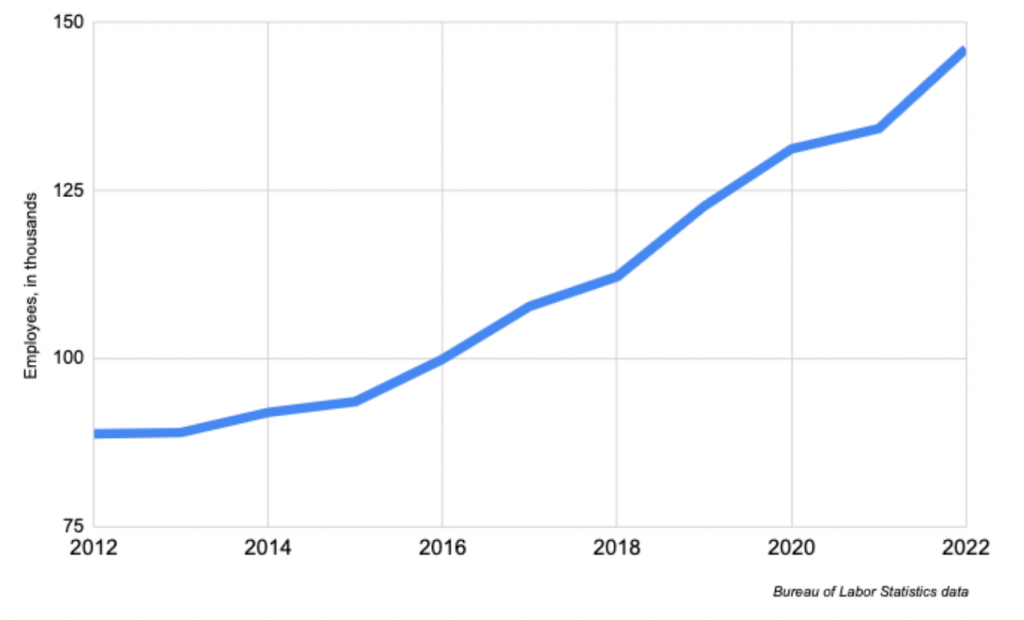
While some high-tech lay-offs are affecting the Seattle jobs market, other openings are accelerating hirings in other sectors.
Massive Growth Turns into Retraction for U.S. High-tech Corporations
If you follow the news and in particular the financial news, you might be more than a little confused by the contradictions of numbers. It seems like every month we have incredibly good job numbers being counted in America. Yet in the same week, we hear how much of an employee shortage we also have.
The economic television spokespeople have been warning of a recession for the past 3 months or so, yet retail sales continue to be steady in most sectors and most areas of this country. A wave of high-tech layoffs is already underway, and more are planned for the very near future. At the same time, there are lots of high-tech openings still available.
Taylor Soper, GeekWire’s managing editor, wrote an in-depth article explaining some of the layoffs announcements coming from Microsoft and Amazon, to name just two of the corporations cutting back. Many of some of the tech stocks have fallen off in value this year. Not so much because of the usual business issues, but because so many were overvalued in the stock market. There has been a leveling of some of the higher-priced stocks.
Heads Up Seattle
The Seattle area has long had a major financial anchor or job producer. In the ’50s it was Boeing. Then in the ’60s and ’70s, it was Microsoft. For the past two decades, it has been more Microsoft growth and the addition of Amazon’s growth in Washington State. That is about to change somewhat for Seattle job seekers.
Soper explains it this way: Big Tech’s big boom is over. But the sector overall is a long way from a bust.
“Citing the uncertain economy, cooling customer demand, and the need to sharpen their focus on the most promising areas for growth, both tech giants are moving ahead with major job cuts — impacting their workforces both globally and at their respective headquarters.”
For now, at least, tech leaders see in the cutbacks, not a retrenchment for the industry but rather a rebalancing of power after a decade of remarkable growth for Microsoft, Amazon, and other big companies.
The number of layoffs as a percentage of total tech employment is “very low,” said Michael Schutzler, CEO of the Washington Technology Industry Association.
“All those tech employees who want to work will find a new job quickly,” he predicted.
The Numbers
Redmond, Wash.-based Microsoft announced Wednesday morning that it will cut 10,000 jobs, about 5% of its workforce, including an initial 878 positions in the Seattle region.
“These are the kinds of hard choices we have made throughout our 47-year history to remain a consequential company in this industry that is unforgiving to anyone who doesn’t adapt to platform shifts,” wrote Microsoft CEO Satya Nadella in a memo to employees announcing Microsoft’s cuts.
Meanwhile, Amazon on Wednesday began the latest phase of its 18,000-person layoff, the largest in its history, impacting sites including its Seattle headquarters.
Facebook parent Meta, Salesforce, Redfin, Qualtrics, and other public companies likewise announced recent cuts that collectively impact thousands of employees in the Seattle region. Smaller startups are also trimming staff.
There will be more good and bad numbers to come in 2023. It just remains to be seen just how good or bad they turn out to be. However, there are a few bright spots in the geekwire.com story.
A search for tech jobs on Glassdoor shows more than 5,000 postings, and recent surveys show that most laid-off tech workers are finding jobs within three months. Washington’s information sector added 8,700 workers in 2022, according to the state’s most recent monthly employment report. Overall private-sector employment rose by 3.8%.
There were an estimated 155,000 information workers in the Seattle region as of November, an 8.1% increase from the prior year, and up from about 90,000 a decade earlier, according to data from the Bureau of Labor Statistics. The Seattle area ranked as the best city for STEM professions, according to a new study published Wednesday by WalletHub.
So it is not all doom and gloom for 2023 in the high-tech and AI sectors. But there may be a few bumpy months to begin the year with.
read more at geekwire.com







Leave A Comment